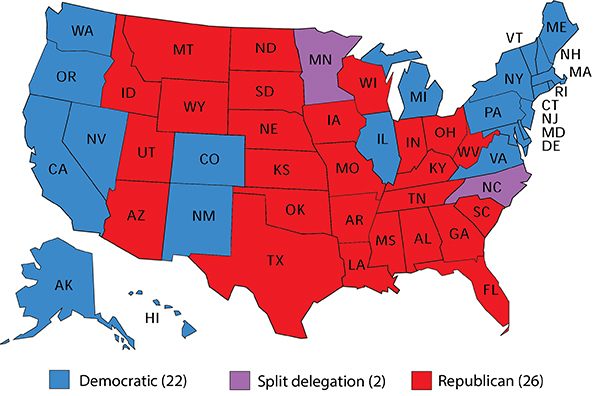

The 2024 presidential election will come 200 years after the 1824 election, which was remarkable in two ways. First, it was the first election in which a majority of the states chose their presidential electors by popular vote. Eighteen states did that while the other six states had the state legislature pick the electors. So, in a very real way, 2024 will be the 200th anniversary of democracy.
However, that popular vote thingie didn't work so well that year. In 1824, there were four credible candidates: Andrew Jackson (99 electoral votes), John Quincy Adams (84), William Crawford (41), and Henry Clay (37). Since no one had a majority, the election went to the House, with each state getting one vote. This was the most recent time that happened, so 1824 is also the 200th anniversary of the last time the House picked the president. As you know, it picked Adams, although Jackson, the Donald Trump of his era, got revenge by winning in 1828.
This election brings up the question of whether the House might end up picking the president again, 200 years after the last time it did it. The most likely scenario in which this occurred is that Trump loses the Republican nomination, runs as an independent (or as the candidate of the Trumpist Party), and wins some electoral votes (for example, West Virginia and some of the states in the Interior West). In a close election, that could happen. The map at the top of the page gives Biden 303 EVs. Suppose Ron DeSantis is the Republican nominee and he wins Arizona and Georgia against Joe Biden. That is certainly plausible, given how close they were in 2020. This would reduce Biden's total from 303 to 276. If DeSantis also flipped Wisconsin, another very close state, the total would be Biden 266 and DeSantis 272.
If that were the final result, DeSantis would win. End of story? Well maybe not. Suppose Trump won Wyoming as an independent. Then the result would be Biden 266, DeSantis 269, Trump 3. Or if Trump won only West Virginia, it would be Biden 266, DeSantis 268, Trump 4. You need 270 to win, so in both of these cases, the election would go to the newly elected House seated on Jan. 3, 2025. It has to be the new House, because the electoral votes aren't official until they are counted in a joint session of Congress on Jan. 6, 2025. So who won would depend on which party controlled the most state delegations in the new House.
We don't know which party will control the new House, so all we have to go on is the current one. Here is the current map:

In the current House, Republicans control 26 delegations, Democrats control 22 delegations, and two (Minnesota and North Carolina) are split. If the election ended up in the House, each representative would be free to vote for any of the top three candidates. That could conceivably mean that Trumpy Republicans voted for Trump, not DeSantis, so it is not 100% certain that DeSantis would get the most states. It could get rather messy.
In a blue or red wave in 2024, control of the House delegations could change. Larry Sabato's Crystal Ball has 22 delegations safe for Republicans and 13 safe for Democrats. But again, they are counting on Rep. Harriet Hageman (R-WY), Wyoming's lone representative, as a Republican vote (i.e., for DeSantis). We're not so sure. We think she could vote for Trump. Several other smaller delegations could also go for Trump. It is certainly possible that even though a majority of delegations were nominally Republican, no candidate got to 26. If that stalemate persisted, then the vice president chosen by the Senate from the top two candidates would act as president. If the Senate were split 50-50 and voted strictly along party lines, then the speaker of the House, who is elected by simple majority on the 15th ballot, would become president. We wonder if the bookies are taking bets on Kevin McCarthy or Rep. Hakeem Jeffries (D-NY) becoming president? It isn't that farfetched. (V)